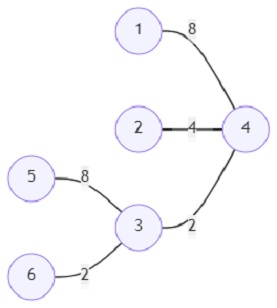
 Data Structure
Data Structure Networking
Networking RDBMS
RDBMS Operating System
Operating System Java
Java MS Excel
MS Excel iOS
iOS HTML
HTML CSS
CSS Android
Android Python
Python C Programming
C Programming C++
C++ C#
C# MongoDB
MongoDB MySQL
MySQL Javascript
Javascript PHP
PHP
- Selected Reading
- UPSC IAS Exams Notes
- Developer's Best Practices
- Questions and Answers
- Effective Resume Writing
- HR Interview Questions
- Computer Glossary
- Who is Who
Program to find out the sum of minimum cost within a graph among all vertices in Python
Suppose there is a weighted graph with n vertices and m edges. The edges have the weights in powers of 2. Any vertex can be reached from any vertex in the graph, and the cost of travel will be the addition of all the edge weights in the graph. We shall have to determine the sum of minimum cost between each pair of vertices.
So, if the input is like

and number of vertices (n) = 6; then the output will be 2696.
The sum of all the distances is 2696.
To solve this, we will follow these steps −
- Define a function par_finder() . This will take i, par
- if par[i] is same as -1, then
- return i
- res := par_finder(par[i], par)
- par[i] := res
- return res
- if par[i] is same as -1, then
- Define a function helper() . This will take i, par, w, G, n
- child := 1
- for each item in G[i], do
- if item[0] is same as par, then
- go for next iteration
- otherwise,
- child := child + helper(item[0], i, item[1], G, n)
- if par is not same as -1, then
- ans := ans + child * (n - child) *(1 * 2^w)
- return child
- if item[0] is same as par, then
- G := a new list containing n + 1 other lists
- edges := a new list
- for each item in roads, do
- u := item[0]
- v := item[1]
- w := item[2]
- insert (u-1, v-1, w) at the end of edges
- sort the list edges by the edge weights
- par := a new list of size n + 1 initialized with -1
- r_edge := a new list
- for each i in edges, do
- if par_finder(i[0], par) is same as par_finder(i[1], par), then
- go for next iteration
- otherwise,
- insert i at the end of r_edge
- insert pair (i[1],i[2]) at the end of G[i[0]]
- insert pair (i[0],i[2]) at the end of G[i[1]]
- par[par_finder(i[0], par)] := par_finder(i[1], par)
- if par_finder(i[0], par) is same as par_finder(i[1], par), then
- ans := 0
- helper(0, -1, 0, G, n)
- return ans
Example
Let us see the following implementation to get better understanding −
def par_finder(i, par) : if par[i] == -1 : return i res = par_finder(par[i], par) par[i] = res return res def helper(i, par, w, G, n) : global ans child = 1 for item in G[i] : if item[0] == par : continue else : child += helper(item[0],i,item[1], G, n) if par != -1 : ans += child * (n - child) * (1 << w) return child def solve(n, roads): global ans G = [[] for i in range(n + 1)] edges = [] for item in roads : u,v,w = map(int, item) edges.append((u-1, v-1, w)) edges = sorted(edges,key = lambda item : item[2]) par = [-1 for i in range(n + 1)] r_edge = [] for i in edges : if par_finder(i[0], par) == par_finder(i[1], par) : continue else : r_edge.append(i) G[i[0]].append((i[1],i[2])) G[i[1]].append((i[0],i[2])) par[par_finder(i[0], par)] = par_finder(i[1], par) ans = 0 helper(0, -1, 0, G, n) return ans print(solve(6, [(1,4,8), (2,4,4), (3,4,4), (3,4,2), (5,3,8), (6,3,2)]))
Input
6, [(1,4,8), (2,4,4), (3,4,4), (3,4,2), (5,3,8), (6,3,2)]
Output
2696

Advertisements
